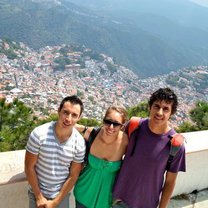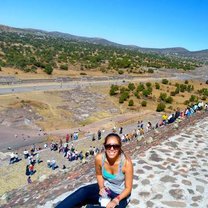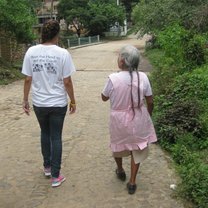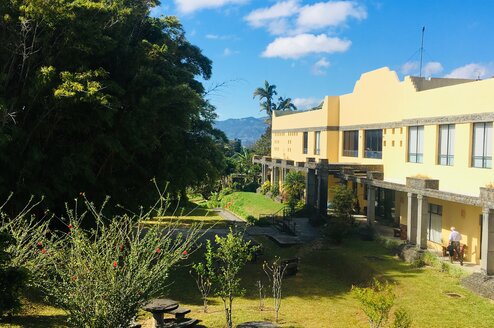Did YOU study abroad?! If so, where and what inspired you to go?
Jessica: I studied abroad twice - a semester in Beijing, China and a summer in Vilnius, Lithuania. There was no other choice for me - literally (my parents required each of their three children to pursue an international experience while in college) and figuratively (I never imagined NOT studying abroad).
If we were to produce a TV show titled, "When Studying Abroad Goes Wrong!", what do you think our first episode should be about?
Jessica:I think it should be about students who go abroad physically, but don't REALLY go abroad emotionally, mentally, and relationship-wise. In other words, I think it is unfortunate when students from the U.S. do not make an effort to go outside their program to engage with local people in a meaningful way. Related, students often spend so much time online that it reduces the exposure to the new community. Hence, going abroad without REALLY going abroad. That is about the most "wrong" thing to do when studying abroad because students often regret this when they get home, realizing that perhaps they did not make the most out of a once-in-a-lifetime experience.
Many students express interest in going abroad, but never follow through. What insight can you offer students to help them achieve their study abroad goals?
Jessica: My biggest piece of advice would be to plan, plan, plan. And plan EARLY. If you want to study abroad, start thinking about your to-do list the moment you step on campus. How do your classes need to be planned so that you can take a semester away? What funding and aid will transfer? How can I work with my parents or guardians to help them see the value in the experience? These types of tasks cannot be left to the fall semester of junior year if you plan to study abroad spring semester of junior year, or you take the risk of running out of time.
Which country do you think is an underrated study abroad destination?
Jessica: I think Mexico is underrated by students because they do not think it is exotic. Or they think, "I have been there before!" But most people only experience beach communities or perhaps a border community. There is so much more to Mexico. In addition, if your goal in study abroad is to increase your professional skills and knowledge, it should be noted Mexicans are the largest immigrant population in the U.S. - students will live alongside and work with Mexicans on a daily basis. It makes a lot of sense to study in Mexico to better understand a culture and people that will likely be a significant part of your life, even after you return home.
As an alum of CGE's semester program in southern Africa, I can definitely echo Jessica's acknowledgement of CGE's commitment to building relationships with locals and other program participants to cultivate a community built on openminded-ness. Participants are asked to reflect on their impact on the environment and world. Not only were sometimes taboo and difficult topics discussed, but CGE coordinates many opportunities to take action - the kind which "encourages individuals to live as active agents of history, and hence, fosters social transformation rather than the maintenance of the status quo."
Featured Programs:
- Semester in Nicaragua, El Salvador, AND Guatemala - This multi-country semester program emphasizes social change in Central America. By exploring first hand various approaches to economic, environmental, and social justice, students walk away with a better understanding of the richness and diversity of this area. Program also includes multiple home stays in each location.
- Fall semester in Mexico - A more business minded program, here you will debate globalization, U.S. immigration policy, and sustainable economic development in the heart of a country that is more than just a spring break destination.
- Semester in South Africa and Windhoek, Namibia - See and feel the beat of these transitional nations as they work to build a democracy. With the legacies of apartheid and extreme income inequalities challenging their development, you can converse directly with a local on one of your three home stays to hear first hand accounts of the major struggles in their recent history.
Our programs provide opportunities to expand your worldview and to challenge your perceptions about global justice and human liberation. Issues of social responsibility are at the heart of all of our programming.















